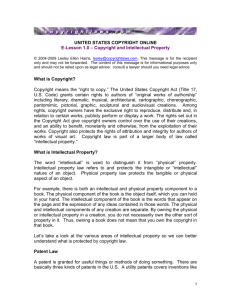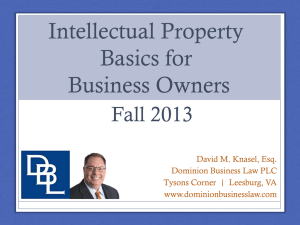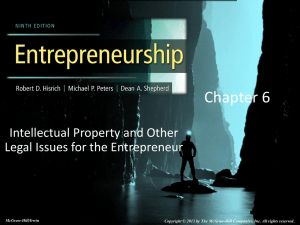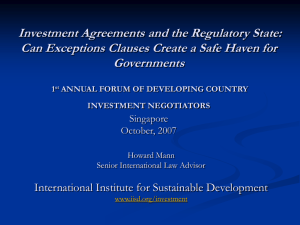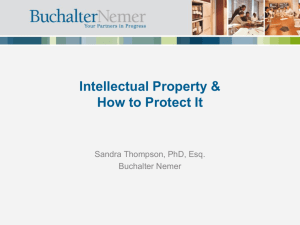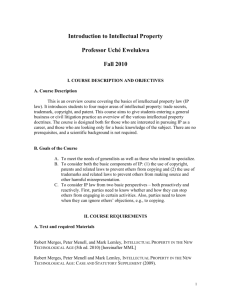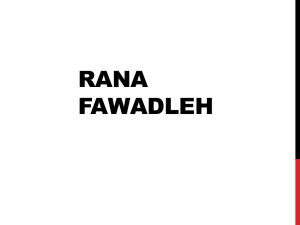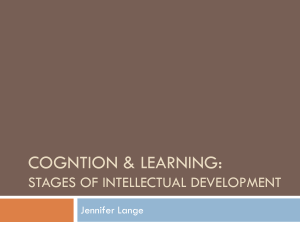Chapter-5
advertisement
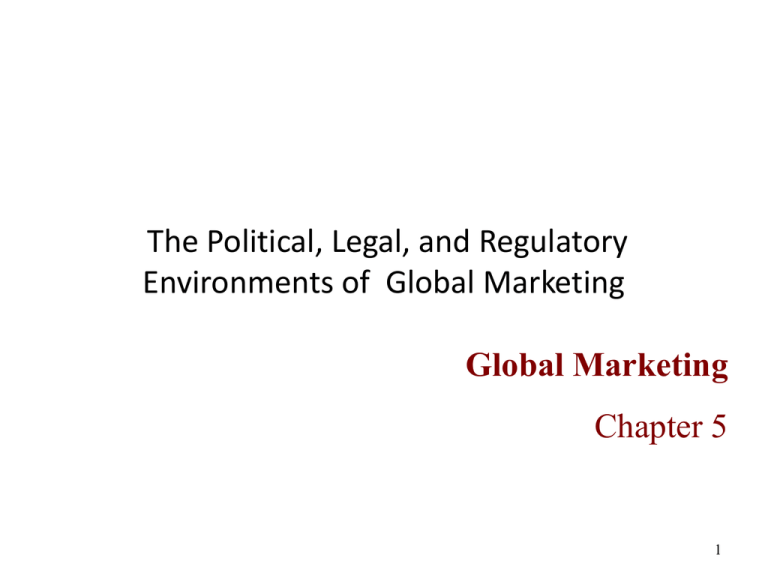
The Political, Legal, and Regulatory Environments of Global Marketing Global Marketing Chapter 5 1 Introduction • The global marketer must comply with each nation’s laws and regulations with respect to the cross-border movement of services, people, money, and know-how. • Be aware of laws and regulations that change frequently or are ambiguous and can hamper the company’s activities. 5-2 The Political Environment • Made up of governmental institutions, political parties, and organizations that rulers and people use to wield power • Each nation’s political culture reflects the importance of the government and legal system • Issues for foreign investors include the governing party’s view on sovereignty, political risk, taxes, equity dilution, and expropriation 5-3 Nation-States and Sovereignty Sovereignty can be defined as supreme and independent political authority. Many governments in developing countries exercise control over their nations’ economic development by passing protectionist laws and regulations. 5-4 Political Risk • Risk of change in political environment or government policy that would adversely affect a company’s ability to operate effectively and profitably When perceived political risk is high, a country will have a difficult time attracting foreign direct investment 5-5 Political Risk • Some examples of political risk include: – – – – – – – – – War Social unrest Politically-motivated violence Transparency Social conditions (population density and wealth distribution) Corruption Crime Labor costs Tax discrimination 5-6 Thailand 5-7 Taxes Government taxation policies • High taxation can lead to black market growth and cross-border shopping Corporate taxation • Companies attempt to limit tax liability by shifting location of income 5-8 Seizure of Assets • Expropriation–governmental action to dispossess a foreign company or investor – Compensation should be provided in a “prompt, effective, and adequate manner” • Confiscation occurs when no compensation is provided 5-9 Expropriation President Hugo Chavez , Venezuala ordered the expropriation 5-10 Seizure of Assets • Nationalization–a government takes control of some or all of the enterprises in an entire industry – Acceptable according to international law if: • satisfies public purpose • includes compensation 5-11 Seizure of Assets • Creeping expropriation– The continual restriction of private property rights gradually over time by a government. – – – – – – Limits on repatriation of profits, dividends, or royalties Technical assistance fees Quotas for hiring local nationals Price controls Discriminatory tariff and nontariff barriers Discriminatory laws on patents and trademarks 5-12 International Law • The rules and principles that nation-states consider binding among themselves • Disputes between nations are issues of public international law – World Court or International Court of Justice (ICJ) – Judicial arm of the United Nations 5-13 Common Law vs. Civil Law • The Napoleonic Code of 1804 drew on Roman legal system and is the basis for continental European law today. Code law is also known as civil law. • U.S. law is rooted in English civil law. 5-14 Common Law vs. Civil Law A civil law country is one in which the legal system reflects the structural concepts and principles of Roman empire in 16th century In a common law country, many disputes are decided by reliance on the authority of past judicial decisions or cases 5-15 Common Law vs Civil Law Pros and Cons The benefit of a common law system is that you can be confident of what will happen in your case if a similar case has been heard before. The drawback is that if you have an unusual case, there is nothing to stop a judge creating a new law and applying it to your case. The benefit of a civil law system is that you can only be judged by the laws which were actually written down in front of you at the time. The drawback is that even if previous cases show you should win your case, there is no guarantee a judge will interpret the code in the same way on your case. 3-16 Islamic Law • Legal system in many Middle Eastern countries • Sharia–a comprehensive code governing Muslim conduct in all areas of life, including business – Quran–Holy Book; like code law – Hadith–like common law • Based on life, sayings, and practices of Muhammad • Identifies forbidden practices “haram” 5-17 Important Business Issues • Get expert legal help • Prevent conflicts – Establish jurisdiction – Protect intellectual property – Protect licenses and trade secrets – Avoid bribery 5-18 Jurisdiction Refers to a court’s authority to rule on particular types of issues arising outside of a nation’s borders or to exercise power over individuals or entities from different countries. Employees of foreign companies should understand the extent to which they are subject to jurisdiction of hostcountry courts Courts have jurisdiction if it can be demonstrated that the company is doing business in the state the court sits 5-19 Intellectual Property Intellectual property must be registered in each country where business is conducted Patent–gives an inventor exclusive right to make, use, and sell an invention for a specified period of time Trademark–distinctive mark, motto, device, or emblem used to distinguish it from competing products 5-20 Copyright–establishes ownership of a written, recorded, performed, or filmed creative work Infringement of Intellectual Property • Counterfeiting–unauthorized copying and production of a product • Associative Counterfeit/Imitation–product name differs slightly from a well-known brand • Piracy–unauthorized publication or reproduction of copyrighted work 5-21 5-22 5-23 5-24 Protecting Intellectual Property • In the U.S., registration is with the Federal Patent Office • In Europe, applicants use the European Patent Office or register country-bycountry • For Thailand, Thailand Patent and Trademark Office: Department of Intellectual Property (DIP) 5-25 Antitrust • Laws are designed to combat restrictive business practices and to encourage competition – Enforced by FTC in the U.S., Fair Trade Commission in Japan, European Commission in European Union – The Sherman Act of 1890 prohibits certain restrictive business practices including fixing prices, limiting production, allocating markets, or any other scheme designed to limit or avoid competition. Law applies to U.S. companies outside U.S. borders and to foreign companies operating in the U.S. 5-26 Licensing and Trade Secrets • Licensing is a contractual agreement in which a licensor allows a licensee to use patents, trademarks, trade secrets, technology, and other intangible assets in return for royalty payments or other forms of compensation • Important considerations – What assets may be licensed – How to price assets – The rights granted 5-27 Licensing and Trade Secrets • Trade secrets are confidential information or knowledge that has commercial value and is not in the public domain and for which steps have been taken to keep it secret • To prevent disclosure, use confidentiality contracts • The Uniform Trade Secrets Act has been adopted by most U.S. states • TRIPS, Trade-Related Aspects of Intellectual Property Rights signed by members of GATT 5-28 Bribery and Corruption • Foreign Corrupt Practices Act – Requires publicly held companies to institute internal accounting controls that would record all transactions – Makes it a crime for a U.S. corporation to bribe an official of a foreign government or political party to obtain or retain business – Prohibits payments to third parties when there is reason to believe it may be channeled to foreign officials 5-29 2008 Corruption Rankings “Cleanest” Countries 1 Denmark 1. New Zealand 1. Sweden 4. Singapore 5. Finland 5. Switzerland 7. Iceland 7. Netherlands 9. Australia 9. Canada Most Corrupt Countries 171. Dem. Rep. Of Congo 171. Equatorial Guinea 173. Chad 173. Guinea 173. Sudan 176. Afghanistan 177. Haiti 178. Iraq 178. Myanmar 180. Somalia 5-30 Conflict Resolution • Litigation • Formal arbitration – Settles disputes outside of court – Groups agree to abide by panel’s decision 5-31



